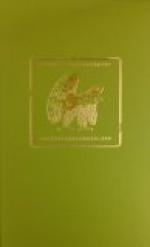He nodded; his eyes did not move from her face, but they shone like two chippings of blue glacier ice, and his voice when he spoke piped its sharpest key. “So am I. I’ve got an option on a pocket somewheres in this range, and the lady I’m inquiring for happened to homestead the quarter below. It sort of overlaps, so’s she put her improvements on the wrong edge. Yes, ma’am, I’ve likely made a mistake, but, you see, I heard she had a bunch o’ goats.”
There was a brief silence then. “Anyhow, you must o’ come from that surveyor,” she said. “Maybe he was just a smooth talker, but he had a nice face; laughing crinkles around his eyes and a way of looking at you, if you’d done a mean thing, to make you feel like the scum of the earth. But he happened to be acquainted with the man that made me a present of my first billy and ewes, and you—favor him a little.” She paused, then went on unsteadily, while her eyes continued to search him. “He was about your size, but he’s been up in Alaska, way in the interior somewheres for years, and the letter I wrote him couldn’t have reached him inside a month. I figured if he came out, he would just about catch the last steamer in October.”
“So he would, if he hadn’t come down to Seattle already.” He stopped, fumbling with the pin, and threw open the wicket. “I guess I ain’t changed much more’n you, Annabel.”
The woman was silent. Her chin dropped; her glance sought the earth. Then Banks turned to fasten the gate behind him, and she started to stalk mechanically up the field towards the cabin. “I feel all broke up,” he said, overtaking her; “like I’d been struck by a blizzard. Why, there was a girl down in Seattle, she sold me a bill of goods that looked more like you than you do yourself. I know I got myself to blame, but I never counted for a minute on your keeping the goats.”
The woman stalked on a little faster, but she could not outstrip the prospector; she turned her face, in refuge, to the flock. “Goats,” she said unsteadily, “goats—are all right when you get used to ’em. They’re something like children, I guess; a sight of trouble but good company and mighty comforting to have ’round. And they’re just as different. There’s old Dad, the cautious looking one standing off there watching us and chewing the end of a thistle. It might as well be a toothpick, and I’ll bet he’s thinking: ‘You can’t get the best of me, no, sir.’ And that piece of wisdom next to him is the Professor. Don’t he remind you of the old schoolmaster down at the Corners? And there goes Johnny Banks. See him? The pert little fellow chasing up the field. You never can tell where he’ll turn up or what he’ll do next.”
She laughed a dry, forced laugh, and Banks echoed it in his strained key. “But we are going to get rid of ’em. They’re a fine bunch—you’ve brought ’em up splendid, made a sight better showing than I could—but we are going to get rid of ’em, yes, ma’am, and forget ’em as quick’s we can. We are going to start right now to make up those seven years.”




